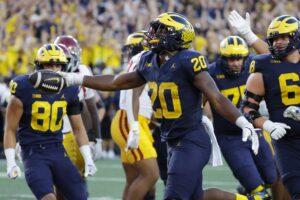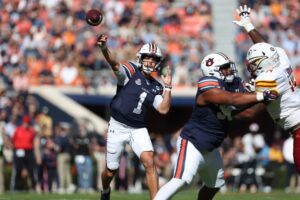College sports is made for rivalries; college football most of all. The annual regional conflicts, the conference showdowns, and all the pomp and circumstance that gets mixed in make college football unlike any other sport. Auburn-Alabama, Ohio State-Michigan, USC-UCLA, Miami-Florida State all have a unique place in college football lore. Over the past few years, we have lost some classic match-ups. With conference realignment we have lost Texas-Texas A&M, Nebraska-Colorado, Kansas-Missouri and others. Penn State and Pitt may also be lost to the winds of change. But it is A Rivalry That Needs Renewing.
It looks like we are about to lose another of the great ones. After 100 games, it looks like Penn State-Pittsburgh is going the way of the history books. The 2019 season is the last one on the books, with out of conference games being scheduled a decade or more in advance. The state of Pennsylvania has provided one of the great rivalries in the game, which has created a stir among fans flocking to sites like Unibet in Pennsylvania. They need to find a way to bring it back.
The rivalry started in 1893. Then the schools took two years off, three seasons off from 1897–99 and another three-year break from 1932–34. The game was played continuously from 1935–92, but once conferences entered the picture, it became increasingly sporadic, and the rivalry has been played only in two four-year spurts: from 1997–2000 and again from 2016–19. Penn State has 53 wins to Pitt’s 43 with four ties.
The 1976 game was one of the most anticipated. Pitt was undefeated and ranked number number one in the nation. The game was at Three Rivers Stadium on the night after Thanksgiving. The score was tied 7–7 at the half. Pitt’s coach Johnny Majors moved Tony Dorsett to fullback for the second half, and the Panthers went on to win 24–7, finishing the regular season 11–0, on their way to a Sugar Bowl victory over Georgia and their first National Championship in 39 years.
The 1981 game is one of the classics in the rivalry. Pitt was once again undefeated at 10–0 and number one in the nation. The game featured two junior quarterbacks, Dan Marino for Pitt and Todd Blackledge for Penn State. Pitt went up 14–0 in the first quarter. Penn State ran off back to back touchdowns to tie it at 14 at the half. Penn State ran of 34 second half points, while holding the Panthers scoreless. The 48–14 final cost Pitt a chance for its second national title in five years.
A potential national championship was on the line in 1982. Pitt had been ranked preseason #1, but had lost to Notre Dame to enter the game at 9–1. Penn State also entered the game 9–1, having lost only to Alabama. This one was a battle of the quarterbacks again with Marino vs. Blackledge in their last regular season game. Penn State won 19–10 on the strength of one Blackledge touchdown pass, and four field goals. Penn State went on to a Sugar Bowl upset of Georgia, earning its first National Championship.
In the 1990’s both teams joined conferences, but not together. Penn State moved on the Big 10, and Pitt went to the now defunct Big East. The Panthers are now in the ACC. The split into different conferences highlighted the varying directions the two programs were going in.
Pitt shut out Penn State 12–0 in 2000, the last game before they went on that 15-year hiatus. Penn State wanted an unbalanced schedule. They wanted more home games than what Pitt would get. That went a long way into having no agreements beyond what was already committed to.
Penn State has won the last three but there is now nothing to look forward to for the foreseeable future. Pitt athletic director, Heather Lyke, reportedly sent a proposal in 2018 to her Penn State counterpart, Sandy Barbour, regarding a four-game series renewal in 2026. The talks got bogged down in the juggling of non-conference schedules and as of date there is no agreement. Barbour called the process a “complicated puzzle.” The Big 10 requires it schools to play nine conference games. That leaves three openings for non-conference opponents. They have less flexibility than does Pitt, which plays in the ACC and is only required to have eight conference games.
Whether it be a Saturday night white-out at Beaver Stadium in Happy Valley, or Heinz Field in Pittsburgh, the fan bases deserve better than what they are getting. This a rivalry of national notoriety that needs to be put back together post haste.






